This is all well and good, but what happens when a stray pitches up at your front door? Well, you need to consider the Animal Welfare Act 2006 which includes a Duty of Care to animals in your care. This could mean getting the cat urgent veterinary treatment if it's injured, feeding it, and giving it a place to stay until its owners are found.
But how do you find the owner? And what should you do if your search is unsuccessful? Don't stress! We're answering the most frequently asked questions about legal ownership of stray cat/cats in the UK.
Frequently Asked Questions About Stray Cats and What to Do When You Find One
Because cats are often left to wander around on their own, it's pretty much a given that you'll come across a lost or stray cat at some point. Knowing what to do in this situation is key, which is why we're answering the most frequently asked questions we receive with regards to cats, their original owner and the law.
1. What do I do if I have found a stray cat?
First things first. Making sure that the cat is indeed a stray is the first thing you need to do. Check to see if your unexpected visitor is in good condition. Often, a cat that's well-groomed and a healthy weight could very well belong to someone in the neighbourhood, and they're just popping in to say hello.
If the cat is friendly, and happy for you to get close, you should check for a collar or ID tag. If you're able to get the owner's information, give them a call and let them know their pet is safe and make the necessary arrangements for a collection or drop off. In the event there is no collar, you should take the cat to your vet or local Cats Protection branch where they can do a scan for a microchip.
2. Is there a way to locate the owner?
Something else you can do is use a paper collar to establish whether or not the cat has an owner. Even though it's a somewhat simple method in our technological day and age, it's still effective in establishing whether or not the cat has an owner. Simply print the collar, fill in the details and place it around the cat's neck.
3. Are there other ways of finding the owner?
Communication is key. Ask neighbours if they know anything about the cat, or if they recognise it. And if you don't have any joy there, check community groups on Facebook or local groups. There are also a number of websites, like Animal Search that provide a free missing pet search service for lost and found animals.
4. What do I do with the stray in the meantime?

While you're looking for the cat's owners, it's important that you keep it safe with food, water and somewhere warm to stay, If you're unable to bring the cat indoors, you could make use of a feral and stray cat kennel which will provide a warm and safe shelter while you try to locate the owner.
5. Should I make a poster?
It's definitely worth making a poster to advertise the lost or stray cat. Post them around the area and especially in high-traffic areas. Share the poster on Facebook, Twitter as well as websites such as Pets Reunited.
6. What should I do if the cat is injured?
Should you come across a stray or lost cat that is injured, you will need to get it veterinary care as soon as possible. While some organisations offer care and treatment, a lot of them have found themselves under a huge amount of pressure and are unable to assist healthy feral or stray cats.
Having said that, vets have a Duty of Care to treat an injured or sick animal, so we recommend taking the stray to your local vet for the necessary treatment. You can also contact a stray cat rescue organisation in your area.
If the cat is particularly skittish it's best to cover it with a blanket to keep you safe from its claws. If the cat is definitely feral, you might want to trap, neuter and return it.
7. How long before a stray cat is legally yours?
This isn't as straightforward as you'd think. If the cat is microchipped or ID of some kind, it legally belongs to its owners, and they can claim their cat at any time. However, if you've made every attempt to locate the owner without success, you could keep the stray. Keep in mind though, you'll need to be able to provide it with all the necessary care it needs to stay healthy and happy.
8. What should I do if I've found a litter of kittens?

No one can resist a kitten, right? But there are a few things you need to do if you find what appears to be a stray or feral litter.
Check for mum
Most importantly, check to see if the mum is around. This could mean a few hours of undercover work keeping an eye on the kittens. Whatever you do, don't handle the kittens during this time, as it may stop their mum coming back.
Contact a rescue centre
If, after a few hours, there is no sign of mum, you'll need to step in and help. Kittens, especially young ones, are unable to fend for themselves. Get in touch with an animal welfare organisation for help. Depending on where you live, these include the National Animal Welfare Trust, the RSPCA, the Blue Cross or Cats Protection.
Scan mum for a microchip
If you do see mum around, it's a good idea to get her scanned for a microchip. Her owners may very well be nearby and stressing about their missing pet.
Don't keep the litter
As tempting as it might be, keeping the litter of kittens is not a good idea. It's best to get them to a rescue centre where they can be dewormed, vaccinated and spayed or neutered. Once they are ready, they will be rehomed. And at that point, you could certainly consider adopting one yourself.
9. What should I do with a feral cat?

The UK has a large community of feral cats that can't be rehomed, but there are a few things you can do to help if you come across a colony.
Make sure they have food and water
Even though feral cats are capable of taking care of themselves, it's essential that you keep an eye on them during the colder months when food might be a little more scarce. Set up a feeding station and provide them with fresh water.

Give them shelter
As a rule, feral cats aren't particularly comfortable around people or other pets, but that doesn't mean they don't need a warm place to stay when it's cold or raining. If you have feral cats in your area it's worth setting up a shelter where they can keep warm and dry.
Get it veterinary care
If you notice a feral cat with an injury, we recommend getting it the veterinary car it needs. As mentioned before, these cats aren't used to being handled, so it's best to trap it and take it to the vet in a cage. Trying to catch a feral cat could end up with you getting clawed or bitten.
Trap, neuter, return
Although there isn't much you can do about the existing feral cat problem, you can help keep these numbers down by trapping, neutering and returning it. This programme, known as TNR, involves humanely trapping the cat, getting it neutered or spayed and then returning it to its colony. Speak to your local rescue centre to find out if they can assist with this process.
10. How do I keep my cat safe?
Because cats tend to roam, it's worth taking a few precautionary steps to keep yours safe.
Make sure your cat is microchipped
Collars and ID tags are a good idea, but they can be removed or fall off. For this reason, we suggest you get your cat microchipped as soon as possible.
Remember to update your details
If your details are on a pet database it is crucial that you update them regularly. Always provide a mobile number and remember to advise any change of ownership or change of address.
Keep your cat indoors
Even streetwise cats can get lost, which is why we recommend keeping them indoors at night. We also suggest taking extra precautions around fireworks season and bonfire nights.
Don't declaw your cat

Declawing cats is illegal in the UK, however, some cat owners still choose to do this. Not only is this procedure hugely stressful, but it also takes away your cat's ability to climb, and more importantly, defend itself.
Hopefully, we've answered all your questions about stray cats, and what you can do should one cross your path. If you're able to open your home, and heart, to a cat in need, you'll be rewarded in the most wonderful of ways. Of course, we understand if this isn't always possible, but rather than turning a blind eye to the problem, with our handy tips, you can be the solution.

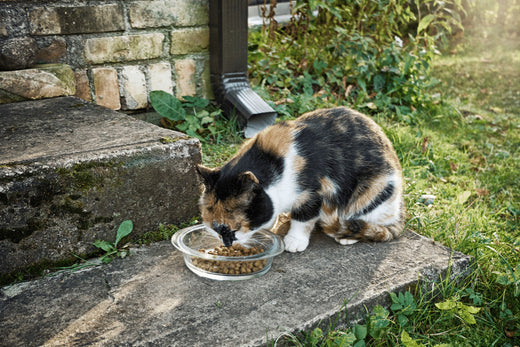

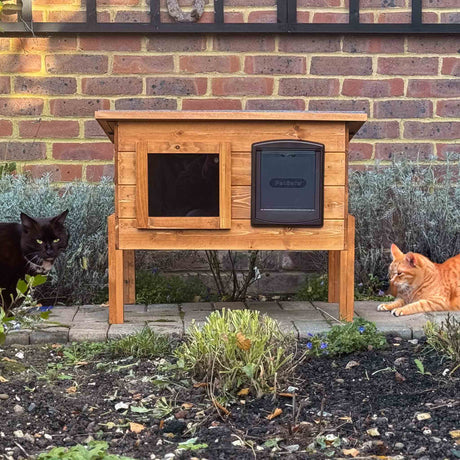
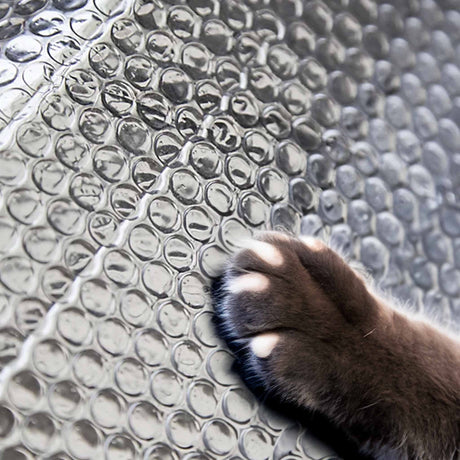

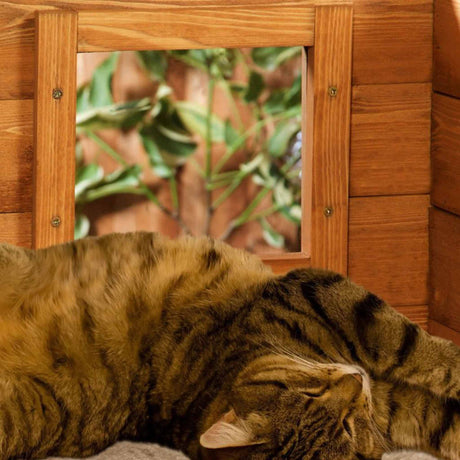
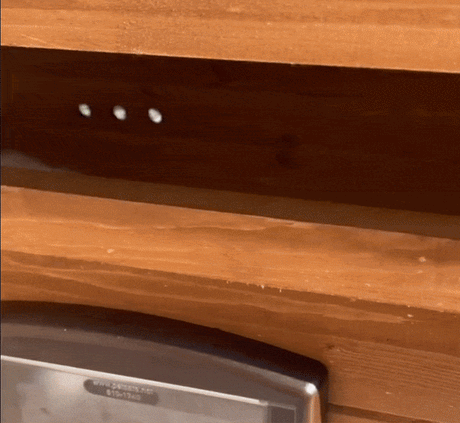

20 comments
Evict the family member. The pets were there first. If he doesn’t like it at your house as it is then he doesn’t have to stay there. Nobody is forcing him to. So tell him to find somewhere else to live. He is not your responsibility. But your pets are. And if he won’t leave then get the police to remove him.
I have had a cat living with me for 14 months. Took cat to vets but wasn’t MicroChip but had been castrated. Found owner off cat who didn’t seem interested in him. She said he lives outside because they have a dog and don’t get on. Says she leaves food out but everytime i go round there is nothing out. Took cat back but within 10 minutes he’s back sitting on doorstep. Could i keep him in stays indoors and sleeps on sofa.
We’ve just had the same happen to us. Hoping to re-home the cat after 7 days to then contact the vet “your vets nuneaton” after 9, to be told he has gone to a rescue centre and will not disclose which one so we’ve no hope of finding him to re-home him now
Hi, I check your blogs like every week. Your writing style is awesome, keep up the good work!
whoah this weblog is excellent i really like reading your articles. Keep up the good work! You recognize, many individuals are searching round for this information, you can aid them greatly.
Hi there mates, its enormous paragraph about cultureand entirely defined, keep it up all the time.
Excellent items from you, man. I have be mindful your stuff previous to and you are simply too great. I really like what you’ve got right here, really like what you’re saying and the way through which you assert it. You’re making it entertaining and you continue to care for to keep it smart. I cant wait to learn much more from you. This is actually a great website.
Hey there! Someone in my Facebook group shared this website with us so I came to check it out. I’m definitely enjoying the information. I’m bookmarking and will be tweeting this to my followers! Superb blog and excellent design.
I visited various blogs however the audio feature for audio songs existing at this website is really wonderful.
I had one elderly cat of 18 years then stray small cats appeared and then a female who looked pregnant. All strays that waited for the back door to be opened and ate my cats food like they have never been fed. The female was so skittish that she would stay away. Don’t know where she had her litter but was pregnant to our knowledge three times. This fourth time she stayed in our house and had four kittens. She stays with them so we contacted our vet to book her in for spaying after weaning. To add to the strays is my neighbours two cats. Loved when kittens but booted out when older both are fearful of humans and aggressive. The Tom started scratching our back door over winter periods and would feed sleep and go out next day only to repeat this cycle every night. The female is hiding in our engine compartment runs up to neighbours door when they come home only to have the door shut leaving her outside. They posted a picture of the Tom as a kitten saying we don’t see it anymore yet told us it was a stray when they first had it. So annoying that so called religious caring folk can not be bothered with other living creatures. The law should change so that owners are stopped from having any pets if they can not provide the basic needs. And cats pick their owners so the law should allow for a stray or lost cat to reside in situ until the period of seven days of owner searches so as not to stress the cats out due to change in environment.
That’s false that a microchipped animal belongs to an owner indefinitely just because it is chipped. It’s also why you should, if you do love your pet, make sure to keep phone numbers and addresses up to date on their chips. I worked for the biggest animal shelter in Idaho, if there is a chip, every effort is made to contact the owner, but if the owner never responds or didn’t update information on the pet’s chip and cannot be reached, then ownership follows the stray hold laws that the animal is in. I made phone call after phone call, following an owner that had moved, but forgot to update the information on the chip. Luckily the old address on file, belonged to a family member and we were able to successfully, reunite the animal with her family. That is not always the case, though. After the mandatory hold, if the owner cannot be reached, the microchip information on file will be deleted, and the new owner’s or new shelter’s information will be uploaded to that microchip.
A couple of months ago .I was home sleeping and a friend came bye my home and dropped off 2 kittens that she had found .I told her I didn’t need any cats at the house even though they were cute as all Getty up.I brought out the kittens some food and water and kept them safe for a couple of days. Then from out of no where I have animal control at my door. My neighbor had called them and said the kittens were in her yard. I then received a citation for the kittens being in her yard. I explained to animal control that I had fed the kittens a few times but they were not my kittens. They neighbor continued to call animal control and made them write me more citations and continued to harrass
me to the point of I had 9 thousand dollars in fines from the kitties supposedly going in her yard. I then appealed the tickets and I had to do a over the phone type court and I explained to the lawyer that was in charge of court hearings claimed that because I had fed the cats once or twice that now own them and I now had lost the appeal and now I owe 9 thousand dollars. I don’t think I should have to pay for these tickets because they are not my kittys and it’s not illegal to feed these homeless kitties.I don’t no how to take this a higher court I can’t afford a lawyer and I can’t and shouldn’t have to pay these outrageous fines.What should I do
One of my neighbours have a kitten which i found , hiding under a van wheel in the dark so i took her in fed waterd her gave her warmth and a little clean as her paws where black, also 3 days later the owner came to collect her as she was looking for her but she was only 4 months old at time since then she gets left out all time and im the only one who will take her in, she is so lovely and so content and once again ive found her outside and she was happy to come back to me the owner doesnt look after her properly and always leaves her put she is 6 months now still getting left outside and with the rain yest im guessing she was out as her paws are black again and she was so hungry when i braught her in and as of now she is lying right next me content and me and the kitten have a really good bond as she remmebers my scent she is no threat, im going to pdsa as her leg looks hurt so im going to get it checked out and to see if she is chipped as she has no coller, if she isnt chipped could i leggally keep her as shes not being looked after. Can i get her chipped and call her mine it takes days to come to mine to collect her as she knows im the only one who will take her in.
We found a stray cat. Took him in for 2 nights and tried to find owner.we could not so we took him to our local vets in Knighton, Powys to see if it was microchipped.it was not. The staff at the vets said they need to keep him for 7 days to see if they can locate the owner, and if no owner was found we could have the cat if we wanted to, which we did such a lovely natured cat and they told us to contact them on Xmas eve.today to collect cat if no owner was found .we called this morning to be told no owner has been found and we could not have the cat ! I asked why and was told by their manager it s there policy to keep cats for 7 days .I told her the 7 days were up. She disagreed saying the cat was bought in in the evening .I told her that was wrong the cat was there by 11am..they close about noon on a Saturday. So now the lovely cat has to stay at Hafren s vet in a cage with one more caged cat for company until Wednesday after the Xmas break. I told her that seemed cruel but it s POLICY she said. It seems very sad when decent people who find a cat and do the right thing have to spoken to like that in a very uncaring nature .I feel they have stole the stray cat after saying we could have it..are there any laws on this. Merry Christmas.if anyone has any advice ?
Me and my bf were told to watch over this cat for his sister the cat is chipped but his sister has left the cat alone with food and water only and never gives it attention and anyway we were told to watch over the cat until his sister had her baby well its been a little over a year now she had her baby and she never comes over to visit her cat she only drops off food and litter her family has told us were allowed to keep the cat but the owner doesnt know at all were planning on keeping the cat should we tell her or keep it a sceret until she asks for him back and are we legally allowed to keep the cat
A member of my family has moved back in & is causing havoc.I have had to move a lot of my things around & living room looks like a jumble sale.But the big problem is my three beloved cats.He says he’s allergic to one & objects to their roaming their home.Can only be in gdn or my room.This has stressed them out,though they r adapting.Their food has to b prepared in the porch & their was a complaint that the smell was in the hall.Between my bringing them in & removing their mat & leads from the back gdn, somebody used the litter tray.Another moan!I am terrified he might drive them to a shelter for spite.He made my old dogs life less happy than it could’ve been,her last few months.I intend to get all chipped.Are questions asked if someone brings an animal to a shelter,do they have to prove ‘ownership’?